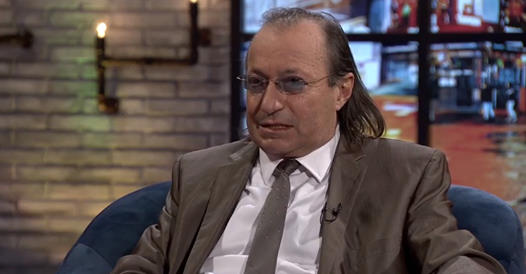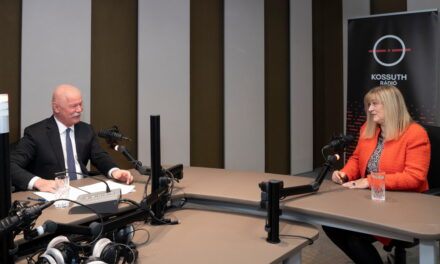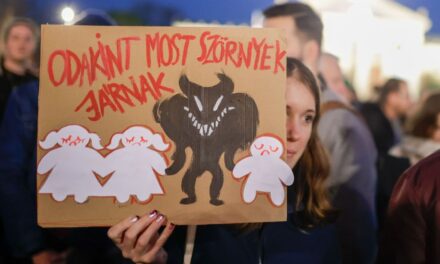Can the culture war alienate culture itself, can the past be definitively rewritten purely along the lines of power demands, what does the seething West have to do with the numerus clausus, and what is the virus culture of Hungarians? We talked with historian Károly Szerencsés about the emotions that seem to be burning the United States, our own cultural debates, virus weekdays stuck between kurucs and labanks, and about a type of person that is ridiculous, but not.
– The Western world is seething, the passions burning behind the apparent calm of the past decades are surfacing in the form of a kind of cultural revolution. Where does this lead?
– I don't want to act like someone who understands exactly what is happening in the world today. Life is a huge paradox, because we live - and if we're lucky, we really live, our days don't just pass - but somehow it always either precedes us or steps on our heels. It is difficult to see what is happening around us, especially if there is no strong will that decisively determines our social existence. This can be positive, for example an inner conviction, faith, but it can also be negative, like the frameworks set up by totalitarian systems. And when we realize what and why happened in our life, it is usually too late, we only have the strength to shake it off.
– Are these ordinary emotions, or is there really a cultural revolution taking place?
– I don't have the impression that the moods are revolutionary, let alone cultural. I see political - i.e. mainly power - nature aspirations that try to use the repressed emotions - anger and frustrations - and partially justified grievances of certain people. In this, the current rebellion is similar to communist practice: it uses the most beautiful and base desires and qualities of man, and that is why it is so dangerous.
– One of the fields of emotions is culture after all! Toppling statues, mutilating them, putting films in boxes, and of course evaluating the past. It's like rewriting the past, isn't it?
- This kind of rewriting of the past - now I am mostly talking about what has been experienced in the United States of America - is also not of a cultural nature, but of a political nature, as it was in our country after 1948. Let me give you an example: if Sándor Márai had been willing to integrate into the socialist system sooner or later, he could not have avoided becoming a recognized author. And I can't even say with full conviction that Hungarian culture did well because he wasn't willing to do that; however, our resistant sense of self is absolutely necessary. But the "runaway resistance" demanded too many victims from this nation. The "escape revolution" - as Ady says. It is certain that if the representation of the past is structured according to political needs, it cannot be permanent in any way.
"What political demand do you mean?"
"It's about power and votes." For now! It's all about that. I would call it a quota revolution, and it is just as false as the "revolution of the proletariat". The quota is actually a closed number. Numerus clausus. I reject the quota based on origin, the one based on gender as well, it is repugnant to me because it is a political move based on real tensions. Because of this, the social problems of African Americans, or the perceived or real disadvantages of women, will never be solved. The crime statistics do not improve either, only new tempers arise. At the same time, of course, I am a supporter of equalizing life chances by all reasonable means: scholarships, colleges, personal and institutional support.
"Why did you put the emphasis when you said: for the time being?"
– Because leadership can easily slip out of the hands of the billionaire "lobbyists" who are calculating in their hundred-story palaces. Are they making a revolution? Should shops, cars, and trash be on fire? Let the police die, peace? If this spirit is unleashed, one day someone will really make that revolution. The ones who really come from the bottom, the ones who really have nothing to lose. Even the "great strategists" can be on the heels of life.
"And our little cultural disputes?" Don't you get a sense of deja-vu?
– I may seem very anti-cultural, but for me this current "culture battle" also lacks culture. Including goals, style and moods. Moreover, this fight has been going on for two centuries, but its current phase is also very petty. Unworthy. Should Albert Wass or Ferenc Hercegh be included in the National Core Curriculum? Along with a hundred other authors? That Géza D. Hegedűs is deathly afraid of acting training from a board of trustees led by Attila Vidnyánszky? Which musician has asked, will ask, or doesn't ask, but receives support for a concert or a record? Will he perform? Or is it allowed at all? Was Ady a freemason, and was he also responsible for Trianon? Unfortunately, this standard also reached the science of history: I have so many meters of "quotation". Measure it! What can we do? We bow deeply. This is also just a quota.
"Is that also numerus clausus?"
- Exactly! And I'm also talking about a type of person who is ridiculous, but still not. Because we've experienced what it's like when your true self manifests without limits. We could joke, but we really wouldn't do it wisely, because this type is violent. You have to replace talent, good intentions, and virtues with something. For example, with ambition, herd aggressiveness, appropriation of values and values. This type runs away from clean conditions, from real competition. From the community, from the responsibility. He also runs away from pure emotions, such as love, the harmony between men and women, and family. Also from work. The network of hidden quotas and intricate informal relationships is perhaps even more dangerous in a society than open restrictions. It's hard to defend against him. The biggest stake in the current "debate" would be discovery. Because in these "networks" you can get away with it. Also in science, culture, economy. And this is doing incredible damage to the nation. Nasty stupidity. The goal is not to get in, but to eliminate these hidden quotas.
– In several of your interviews and presentations, you spoke about the mission of the Hungarian people, most recently on the occasion of the anniversary of the Trianon peace decree. How do you see this mission, the standing of Hungarians during the current pandemic? What is our virus culture like?
- What if? Kuruc-labanc. Of course, it's not appropriate to joke about it either, sorry. But it's not entirely a joke. This epidemic presents us with a challenge like hardly anything in the foreseeable past. Even the nightmare that we will suddenly run out is not so scary - staying with biology. But just as demography is not only, or even primarily, a biological issue, neither is this epidemic. In such a case, the power, will and ability of a nation are shown. It seemed to me that Kuruc-Labanc had agreed so far: let's be careful! Even to each other. Because then neither that nor that will make sense. If, on the other hand, politics gets involved in this - and does so from the first minute - and then claims the character of a "cultural revolution" for itself, as you say, it would cause great damage. We also have our own characteristic that we are less capable of persistence than of learning. This already seems to be confirmed.
"And your personal experiences?" We know from your books that you belong to a particularly vulnerable group, as you have been battling an incurable disease for twenty-six years and have undergone several transplants.
"It's a difficult matter, but I think I can take care of myself." If I really have to, I only go out of the house in white gloves and a mask. Sometimes it's hard to tell if people are sorry or rather stupid? Sometimes I'm ashamed of being a coward, and then I get angry when I see other people without masks at the post office or gas station. I know a lot depends on it. For me and many of us, it is our life, but somehow also our nation's self-esteem. How is it still there? Exaggeration?
"I wouldn't think so." Surely this will be as it should be. "As intended". A novel of yours was published under this title in 2007, and our conversation two years ago also bore this title. Then, in addition to your historical works, there was also talk of your work with a literary demand and some new volumes. What are you working on now?
"The need is hardly left... But it's tenacious!" What am I working on? On my oeuvre. Perhaps the keystone is still missing, although it could be, it has now been put in place. I was constantly in a hurry, I had a lot of trouble with time, it was running ahead of me; am I catching up or falling behind? He steps on my heels. After all, I always considered teaching to be my most important job. That's what I'm getting ready for. I am waiting for enthusiastic, interested and bored pairs of eyes. They all inspire. I wish we didn't have to meet through a screen. It was long ago in March when I bought my hat and walked down the imposing staircase of the university for the last time to the gate and almost asked for the key to lock it. But I want to open in September! That's why last year I published a volume with my "literary" nonfiction (Is God Waiting? Hugging, Self-Defense, History - ed.), and also a confession about my beautiful nest, the former Water City (Tegnapi Víziváros - ed.).
- We also talked about the support of Tibor Gyurkovits, as well as about friendship and love. Did everything happen as intended?
"I have few friends, and I have had few loves." They would laugh at me if I told them. But it was worth a hundred times more that I conquered them. Really. Just relying on my inner strength. And they mesmerized me. Therefore, these were sincere friendships and loves. Death is the reason why I have even fewer friends now and love has faded into memory. Death also kidnapped my love - my wife for thirty-three years - Tibor too, what can I say? Yes: it happened as intended. You see, I practice the power of persistence! That's a nice virtue.
The interview took place in August 2020.
Featured Image: PS













